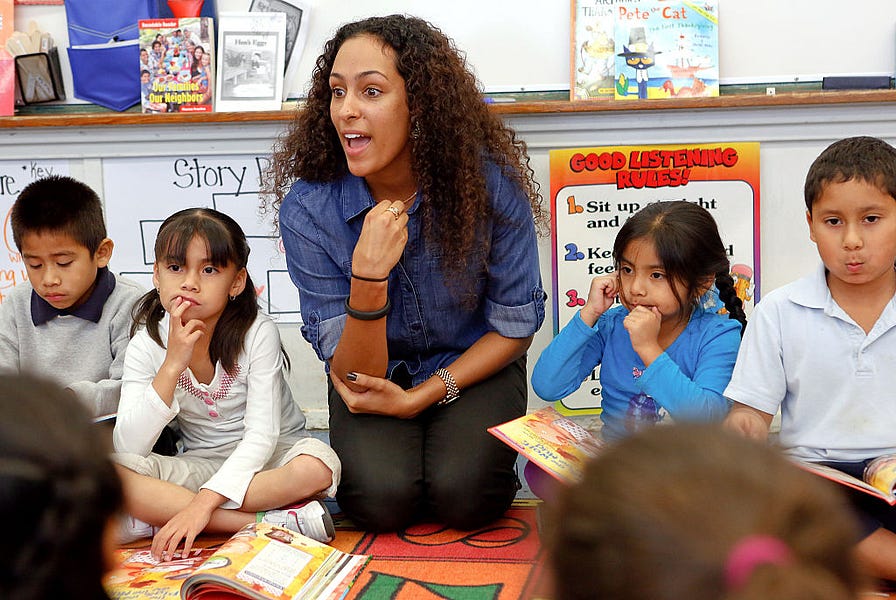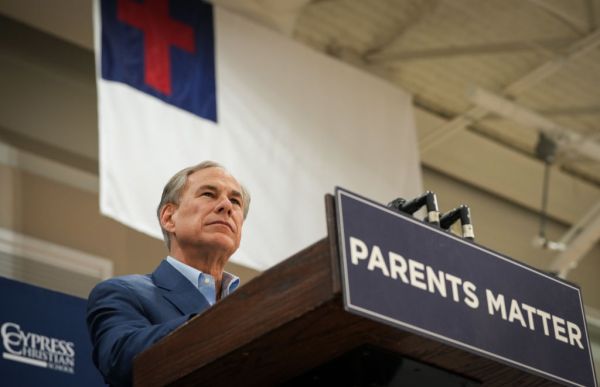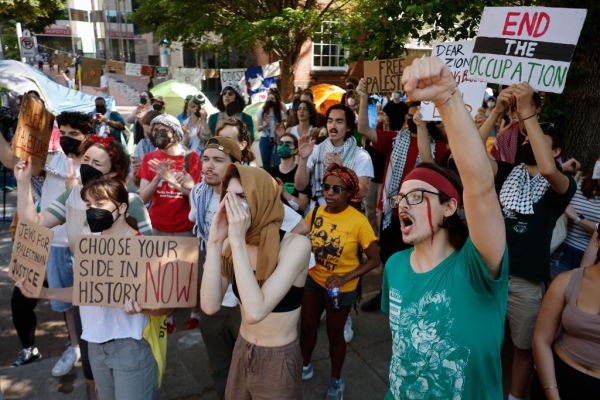Social and emotional learning (SEL) has become a new flashpoint in our educational culture wars. The Washington Post has proclaimed it the “new target” of critical-race-theory attacks, while Salon calls it “the right’s new CRT panic.” SEL loomed large in Florida’s recent decision to reject dozens of math textbooks. Republican school board candidates and plenty of irate parents have railed against it.
But what exactly is SEL? The Collaborative for Academic, Social, and Emotional Learning (CASEL) says that SEL is about mastering “the knowledge, skills, and attitudes to develop healthy identities, manage emotions and achieve personal and collective goals, feel and show empathy for others, establish and maintain supportive relationships, and make responsible and caring decisions.”
In other words, SEL casts a wide net. Indeed, it can capture pretty much everything in and around a school. In 2019, a guide issued by the Aspen Institute’s national commission on SEL explained:
Students learn every day from every interaction with adults. The driver’s greeting as students board the bus; the cafeteria worker’s attention to individual children’s food preferences; the office administrator’s respect for students’ queries; the way custodians maintain the building and value students; the attitude of community partners toward students inside and outside the school setting—all of [it] .. determine[s] whether [a school] is inclusive, welcoming, fair, and supportive.
There’s much about SEL that appeals. It’s stuff that good schools (and parents) have always done, and it’s been a healthy course correction for an education system that’s been test-obsessed in recent decades while giving short shrift to character development and civic formation. As CASEL board chair Tim Shriver and I noted a few years ago, “Since the dawn of the republic, teachers and schools have been tasked with teaching content and modeling character,” and, pursued responsibly, SEL can help with all of that.
In fact, while SEL can seem like a new idea, it’s more of a variation on a historical theme—that educators cannot focus only on academic mastery but must also develop the “whole child.” Readers who are so inclined can trace this impulse to John Dewey, Rousseau’s Emile, and all the way back to Plato’s Republic.
Given all this, SEL’s surging popularity is no great surprise—especially after the dislocations of the pandemic. In fact, SEL was already flying high in 2019 when that Aspen commission issued a blockbuster report, backed by an impressive array of funders and endorsees. The research on persistence that fueled Angela Duckworth’s New York Times best-seller Grit? That’s SEL. So is psychologist Carol Dweck’s influential research on “growth mindset.” And two years of pandemic, during which kids were lonely, isolated, and suffered walloping blows to their social and emotional well-being, have only turbocharged SEL’s ascent.
But as with so many well-meaning education reforms, SEL has a Jekyll-and-Hyde aspect. As has been true with the Common Core and “anti-racist education” (née critical race theory), SEL can be reasonably described both as a sensible, innocuous attempt to tackle a real challenge and, too often, an excuse for a blue, bubbled industry of education funders, advocates, professors, and trainers to promote faddish nonsense and ideological agendas. The latter is why SEL invariably comes up as a justification for doing away with traditional grading, eliminating advanced math, subjecting students and staff to “privilege walks,” or teaching first-graders about gender identity.
School safety illustrates the fine line that SEL seeks to walk. It’s a truism that kids who are relaxed, comfortable in their own skin, and able to get along with peers are less likely to disrupt classrooms or bully other kids. So, it’s easy to argue that promoting SEL can make schools safer. However, SEL proponents also tend to favor “restorative justice” as the preferred approach to accomplishing that goal. The problem is that the evidence for “restorative justice” is unconvincing, at best. Rather than suspending or expelling dangerous students, schools sit them down to share their feelings. While this may sometimes be life-affirming in the right hands, there’s good reason to believe this stuff makes schools less safe when done rashly or clumsily (as is too often the case).
While the aims of SEL may be commonsensical and bipartisan in the abstract, the community of educational advocates, funders, researchers, and leaders who shape the practical reality of SEL share notions of “commonsensical” and “bipartisan” that are out of whack with those of most Americans who don’t live in the Acela corridor or on the Pacific Coast.
It can be tough for those outside of education to appreciate just how casually woke the complex of education advocates, funders, scholars, and trainers are. (Interestingly, teachers themselves are generally much more moderate than these influentials.) Ninety-nine percent of the education reformers funded by the Gates Foundation support Democratic causes and candidates. At the nation’s top 20 schools of education, half the faculty study “diversity.” Just the other day, the doyens at the National Council of Teachers of English urged English teachers “to decenter book reading and essay writing” (wait, what?) and instead work to “identify and disrupt the inequalities of contemporary life, including structural racism, sexism, consumerism, and economic injustice.”
The result is that advocates and trainers have, almost by default, infused their cultural assumptions and biases into SEL. AEI’s Max Eden has pointed out that, in the past few years, CASEL has actively redefined core concepts to keep pace with woke dogma. CASEL’s notion of “self-awareness” now encompasses “identity” (as defined in terms of “intersectionality”). “Self-management” now incorporates “resistance” and “transformative/justice-oriented” citizenship. In its “Roadmap to ReOpening,” CASEL stipulates that “self-awareness” now entails “examining our implicit biases” and “self-management” requires “practicing anti-racism.” As Eden notes, none of this is “morally or politically neutral.”
Asking teachers to cultivate character is one thing; telling fourth-grade teachers that they all need to embrace “trauma-informed teaching” is another. Serious research on cortisone levels and student anxiety gets scrambled together with research-free calls for affinity spaces. There’s serious research, but it also gets misapplied by foundations, education professors, and teacher trainers to justify all manner of free-floating silliness.
Because SEL can be understood both as a means and an end, its ranks include advocates willing to dismiss mere “cognitive skills” (like reading and math) in service of grander agendas and also sober proponents who believe it’s about equipping students for academic success. This tension is why so many of the fights over SEL can seem simultaneously serious and silly. On the one hand, it’s entirely reasonable for school surveys to ask students about their views and values if it might help combat bullying, raise red flags, or ensure that schools are welcoming for all students. On the other, it’s equally reasonable for parents to rebel when they learn that schools have asked their middle schooler combustible (and sometimes leading) questions about drug use, gender identity, or sexual activity without even a by-your-leave.
Indeed, perhaps nowhere does SEL show its innate progressivism more than when it comes to values. As Marilyn Rhames, longtime educator and founder of Teachers Who Pray, has observed, “Robust social and emotional development requires much more than engaging puppet shows, deep breathing, yoga poses, and feel-good mantras for students to sing along. Compelling people to change the way they think or their perspective on life is profoundly spiritual.” And yet, she’s noted, “Nobody would know this from looking at the SEL landscape. Despite the centrality of faith to millions of American children and families, faith is conspicuously absent from the SEL scene.”
SEL mandarins share a lot of the cultural DNA that you’d expect to find among the host committee at a Pete Buttigieg fundraiser. Yoga is okay, but formal religion is suspect. SEL proponents are eager to partner with LGBT community groups. But ask if they’ve reached out to local churches or synagogues and many will offer dark, funny looks.
Should parents be concerned about SEL? Well, look. If you’re getting sensible notes from the principal suggesting that teachers are making a concerted effort to promote tolerance, cultivate relationship skills, and encourage better decision-making, that’s generally a terrific thing. But if school SEL missives are dotted with talk of microaggressions and implicit bias, parent-teacher night features a pitch for eyebrow-raising disciplinary strategies, or classrooms are cluttered with feeling thermometers and privilege maps? I’d say concern is in order.
Yet again, as with Common Core or “anti-racist education,” an idea that makes some intuitive sense gets sucked into our roiling culture war by the smug aggression of woke reformers and the inevitable counterpunching from the right. Teachers and parents wind up trapped in between. And something that can and should be useful, when employed wisely and well, instead gets used clumsily and carelessly, sparking yet another radioactive shouting match.
Frederick M. Hess is the director of education policy studies at the American Enterprise Institute.








Please note that we at The Dispatch hold ourselves, our work, and our commenters to a higher standard than other places on the internet. We welcome comments that foster genuine debate or discussion—including comments critical of us or our work—but responses that include ad hominem attacks on fellow Dispatch members or are intended to stoke fear and anger may be moderated.